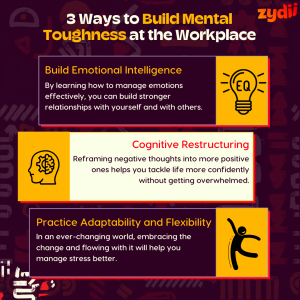Have you experienced such high-stress levels at work that you just want to leave immediately, go home, sit on your couch and put something on to help you forget all about work? Or perhaps you are just constantly on edge, feeling anxious, unable to calm down fully.
Well, welcome to the fast-paced world we live in today, where stress has become an all too familiar companion for employees. Between juggling deadlines, multitasking, and navigating constant change, your mental and emotional well-being can really plummet.
That’s why it’s important to not only know about but to practice effective stress management techniques for the workplace. We’ll be exploring some of these techniques to help you unleash resilience and create a healthier, more productive work environment for yourself and others.
Understanding Stress and Its Impact at the Workplace
Now we’re not saying that stress is bad. On the contrary, a certain level of stress can have some positive effects. And scientists even have a name for the good kind of stress – ‘Eustress’. For instance, imagine that feeling of distress you may have right before a presentation, even though you know you prepared for it. Then you go ahead and present really well, and feel good about yourself after.
Stress, in small quantities, is quite necessary for you to achieve new things, ace projects, or push yourself a little further than the last time.
But negative stress, which the scientists call ‘Distress’, is where the problems come in. When the stress levels are too high for you to manage, then your productivity is lower. You are more likely to be burnt out or find it hard to sleep at night, and you may find yourself lashing out at your colleagues.
By recognizing the signs and symptoms of stress in yourself, or a member of your team, you can start to take proactive steps to address it.
Stress Management Techniques for the Workplace

Here are some steps you can take to help manage stress levels:
1. Mindfulness and Meditation
Now this one can be tough, especially if you’ve been raised to ‘tough it out’ as opposed to slowing down and being mindful. Yet encouraging mindfulness breaks, and practicing techniques like mindful breathing can work wonders for your team’s stress levels, enabling them to become more aware, more focused and less anxious.
2. Physical Exercise:
When was the last time you did some exercise? This could be as simple as skipping rope, taking a walk during your lunch break, or following a short, 5-minute stretch session on Youtube.
Encourage your team members to do some form of physical exercise by organizing fitness challenges, including it in your wellness programs, and talking about its importance in raising awareness.
3. Time Management and Prioritization
Your team can save so much time and reduce their stress levels by prioritizing tasks and using their time effectively. So show them how to manage their time so they can avoid feeling overwhelmed and feel in control over their workload.
4. Supportive Work Environment
There could be one or two employees who are simply swamped with work while others have some time on their hands. Or perhaps they are stuck on a task that another colleague has a fast solution to. So why not foster a culture of support and open communication to encourage your team to help each other?
5. Work-Life Balance
Lastly, encourage your team to take breaks when needed and set boundaries between work and personal life. Show them to respect each others’ personal time. Having the chance to do activities away from work is especially crucial for them to recharge, so they come back refreshed and ready to work.
While you can do your best to manage stress levels among your teammates at the workplace, some things are beyond your control. When you have a major project coming up, or a team member is experiencing hardship outside of work, for instance, it is hard to remain relaxed. This is where providing the tools necessary to become mentally tough becomes critical.
So how do you do this?
Building Mental Toughness in Your Workforce

Let’s look at 3 ways you can help make your team more resilient:
1. Developing Emotional Intelligence
Your employees (and you) need to know how to manage your emotions effectively. How do they navigate conflict, for instance? Do they bottle up their feelings until they explode, making a catastrophe out of it?
Emotional intelligence is especially important to help them build stronger relationships with their colleagues and with themselves.
2. Encouraging Cognitive Restructuring
Now, this is actually simpler to explain than you think. Cognitive restructuring simply means reframing negative thoughts into more positive ones. For instance, ever had a project that you thought was just too huge for you to finish in time? You can instead tell yourself that you’ve done huge projects before, and even break it down into smaller, more manageable tasks.
3. Enabling Adaptability and Flexibility
The last step to building mental toughness among your employees is to foster a culture of adaptability and flexibility in the workplace.
What does this look like?
It can be by providing opportunities for them to learn and practice what they learn. You can also provide feedback that is geared toward helping the employee improve their skill. Each of these would help your employees become open to change, as they constantly improve and upskill.
The Importance of Training in Stress Management and Mental Toughness
Building mental toughness may seem very hard to do as a team leader. But you can invest in training programs that enable your people to get instructed by experts in the field, relieving some pressure from yourself.
So help your team get the training they need to become mentally tough enough to face life’s challenges. That way, you will get a more productive team that has lower turnover rates, and a healthier work environment.
For training on stress management and other key areas of your employees’ well-being, reach out to us so we can help.
